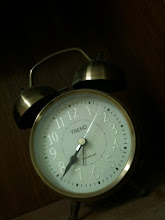I'm feeling a little bit unwell for the last few hours. Feverish. I'm worried that it might last long enough to affect my revision. Hopefully I will get well soon.
This is one of the reasons why last minute revision is not good for students. If you are the ones with such habit, please break it. You'll never know what might happen to you in future at the crucial moments. Accident may occur, or at least you might end up being unwell just like me. An orthopaedic specialist cum visiting lecturer once shared with us the story of his friend who suffered from sports injury while playing rugby weeks before their final exam. He suffered a blow to his face during the scrum which resulted in basal skull fracture and amnesia. He was lucky to survive and managed to sit for the exam. He passed the exam. He's a specialist now. If I were him, I don't think I will be able to sit for the exam, let alone passing it.
Of course, it is never too late. "It ain't over till it's over" - quote from a song. Keep on struggling with all the resources that you have, within the period of time left. Just make sure not to repeat the mistake. I don't want to be the last minute man anymore. That's for sure.
To-do list for the remaining 2 days:
1) Obgyn and Ortho physical examination.
2) Travel to nearest teaching hospital to practice on real patients
3) Respi and CVS
4) Abdominal and Neurological
5) Paediatrics - especially Developmental Assessment.
This is one of the reasons why last minute revision is not good for students. If you are the ones with such habit, please break it. You'll never know what might happen to you in future at the crucial moments. Accident may occur, or at least you might end up being unwell just like me. An orthopaedic specialist cum visiting lecturer once shared with us the story of his friend who suffered from sports injury while playing rugby weeks before their final exam. He suffered a blow to his face during the scrum which resulted in basal skull fracture and amnesia. He was lucky to survive and managed to sit for the exam. He passed the exam. He's a specialist now. If I were him, I don't think I will be able to sit for the exam, let alone passing it.
Of course, it is never too late. "It ain't over till it's over" - quote from a song. Keep on struggling with all the resources that you have, within the period of time left. Just make sure not to repeat the mistake. I don't want to be the last minute man anymore. That's for sure.
===============
To-do list for the remaining 2 days:
1) Obgyn and Ortho physical examination.
2) Travel to nearest teaching hospital to practice on real patients
3) Respi and CVS
4) Abdominal and Neurological
5) Paediatrics - especially Developmental Assessment.








